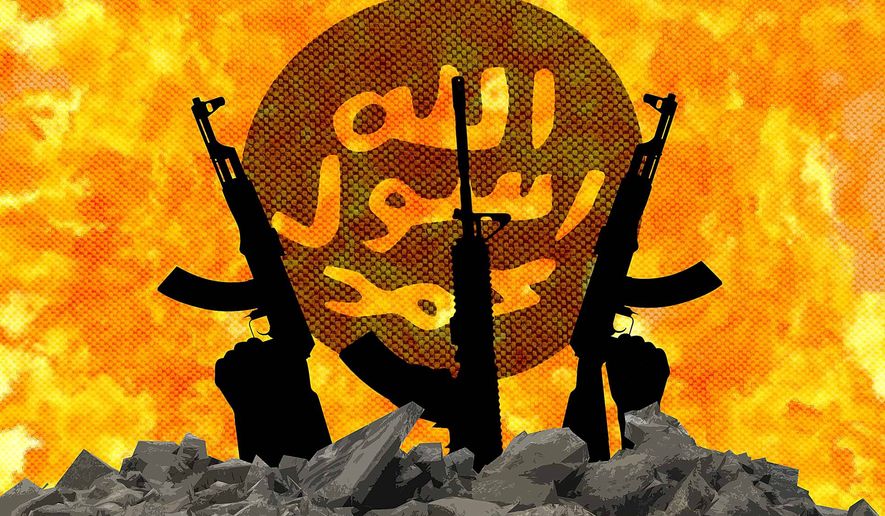OPINION:
On Dec. 10, Iraq celebrated the one-year anniversary of its hard-fought victory against the Islamic State terrorist group (ISIS). The government-organized festivities took the form of a national holiday and the observance of a moment of silence for the victims of the three-year struggle between Baghdad and the Islamist group, which claimed tens of thousands of lives and displaced hundreds of thousands of others.
Speaking to national military leaders, Iraqi Prime Minister Adel Abdul-Mahdi said the occasion commemorated a “proud day for all of us when our brave country defeated the enemies of life, dignity, freedom and peace.”
But has ISIS truly been defeated? More and more signs suggest that the answer is “no.”
True, the group has unquestionably suffered a catastrophic loss of territory since the height of its power in mid-2014, when its self-declared “caliphate” occupied a territory roughly the size of the United Kingdom and held sway over some 8 million souls. But pockets of ISIS territorial control remain — including in Syria’s Deir al-Zour province, where ISIS forces have managed to maintain their grip on the town of Hajin and its environs despite months of ongoing fighting with Syrian opposition forces and extensive airstrikes on the part of the U.S.-led “Global Coalition.”
The group’s strategic capabilities also remain largely intact. Despite its recent setbacks, the organization now appears to be “reconstituting a capable insurgent force in Iraq and Syria,” and still retains a foreign fighter contingent estimated at nearly 30,000 militants, a recent analysis from the Institute for the Study of War, a top national security think tank, has noted. If this trajectory isn’t reversed, the report’s authors warn, “ISIS could regain sufficient strength to mount a renewed insurgency that once again threatens to overmatch local security forces in both Iraq and Syria.”
Such a resurgence isn’t just a local problem, because the group has given every indication that it still seeks to carry out large-scale terrorist attacks against the West.
In the latest sign of this focus, security officials in the U.K. are on alert after intercepting “chatter” among ISIS operatives regarding the possibility of carrying out a large-scale attack on the London Underground using a chlorine bomb. That modus operandi is said to be “inspired” by the recent poisoning of Russian ex-spy Sergei Skripal and his daughter with Novichok nerve agent — an attack which is believed to have been carried out by operatives of the Russian government.
ISIS, moreover, is busy migrating to new strategic arenas, such as Southeast Asia.
In the Philippines, the September apprehension of a Pakistani ISIS trainer seeking to enter the country for the second time has fanned fears among authorities in Manila that they could soon face a upsurge in Islamic radicalism. Indeed, a recent spate of ISIS-linked attacks beyond the group’s current stronghold in the southwestern Sulu Archipelago has lent credence to assessments of the group’s growing strength in — and designs upon — the Southeast Asian nation. So, too, has the August 2018 ISIS announcement of the formal establishment of a new province dubbed the East Asia Wilayah and headquartered in the Philippines.
Meanwhile, in Malaysia, authorities recently arrested seven militants suspected of plotting attacks against civilian targets throughout the country. The suspects, five Malaysians and two Filipinos, were apprehended in Kelantan, Kajang and Sabah, and are said to have links to the Islamic State and one of its premier regional affiliates, Abu Sayyaf.
And in Indonesia, the country’s traditionally inclusive brand of Islam (embodied by mass movements such as the Nahdlatul Ulama and Muhammadiyah) is under growing pressure from pro-ISIS Islamist factions. While the Indonesian government has moved resolutely to outlaw these elements, the radical ideas of the Islamic State are beginning to have a notable — and negative — impact on social cohesion in the world’s most populous Muslim state.
All of which suggests that triumphalism over the end of ISIS, although tempting, is extremely premature. The original threat posed by the Islamic State’s physical “caliphate” in Iraq and Syria may indeed be gone, but the group’s activities and ideology remain a real challenge both to the Muslim World and to the West.
• Ilan Berman is senior vice president of the American Foreign Policy Council in Washington, D.C.




Please read our comment policy before commenting.